***
France 2010
Day 5 - 7th October - Paris: Saint-Denis (Part 3)
I then returned to Paris to head to the Basilica of Saint-Denis - the French Westminster Abbey (the burial place of French royalty).

"Stress? Stress-doron
Dès les premiers signes
Médicament homéopathique
Demandez conseil à votre pharmacien. Lisez attentivement la notice. Si les symtômes persistent, consultez votre médecin...
La durée du traitement est limitée à 15 jours, au-delà un avis médical est nécessaire."
("After the first signs
Homeopathic medicament
Ask the advice of your pharmacist. Read the notice attentively. If the symptoms persist, consult your doctor...
The duration of treatment is limited to 15 days, beyond which medical advice is necessary")
Given that this is the country where "heavy legs" is a disease, homeopathy may be just what many of them need.
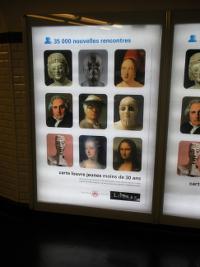
"35 0000 nouvelles rencontres
carte louvre jeunes moins de 30 ans
Rencontres prioritaires et illimitées avec toutes les œuvres du musée à partir de 15€. valable un an"
("35,000 new encounters
Louvre card young less than 30
Encounters prioritised and unlimited with all the works of the museum from 15€. Valid for a year")
This is another reason to return to Paris (which I will be doing in March) in the next 3 years. Though I'm not sure the Louvre will have changed much in 5 years.
At the station of Duroc I heard a zither. I'd have investigated but I was in the train to St-Denis.
Between the métro stops St-Denis Porte de Paris and Carrefour Pleyel there was a rotten egg smell. Meanwhile, the bookshop in the tourist centre in Chartres had smelled of shit. Not very confidence-inspiring, given that this was not Malaysia. Le pays de la merde !
St-Denis was a minority neighbourhood, so I got to see a very different side of Paris (and to a lesser extent France - minorities are rare in the countryside and smaller towns). Apparently it is also infamous for its high crime rate.
Somehow there's something very incongruous about an African traditional costume worn with a large bra strap exposed.
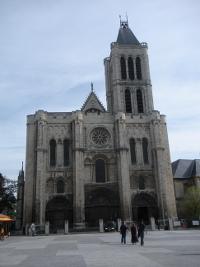
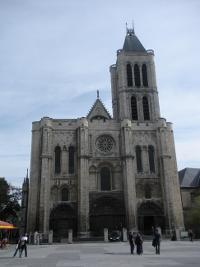
Cathedral Basilica of Saint Denis, the "first truly Gothic building"

This looked like a l'Hôtel de Ville (Town Hall), but as a suburb of Paris I don't think St-Denis qualifies for one.
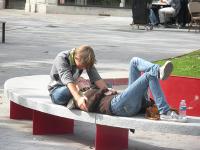
PDA! This is one reason why all women want to go to Paris.

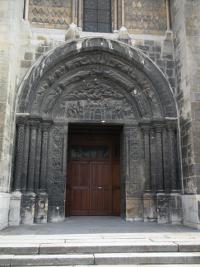
Doors to Basilica
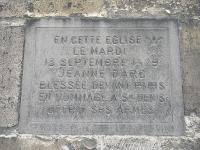
"En cette église le mardi 13 septembre 1429 Jeanne d'Arc blessée devant Paris en hommage à St Denis offrit ses armes"
("In this church on Monday, 13th September 1429, Joan of Arc - wounded before Paris - offered her arms to St Denis in homage")
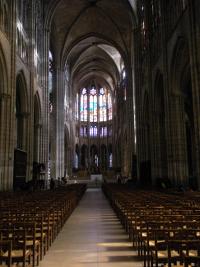
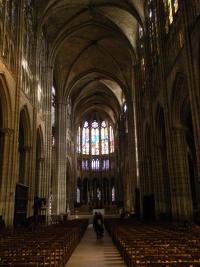
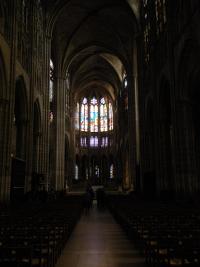
Nave

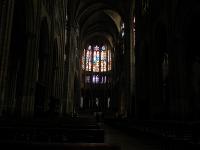
From further down

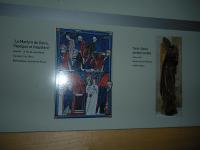
"Le Martyre de Denis, Rustique et Eleuthère", "Saint-Denis portant sa tête"
("The Martyrdom of Denis, Rustique and Eleuthère", "Saint Denis holding his head")
The story is quite funky: "After his head was chopped off, Denis is said to have picked it up and walked ten kilometres (six miles) to the summit of Mont Mars (now Montmartre), preaching a sermon the entire way, making him one of many cephalophores in hagiology"
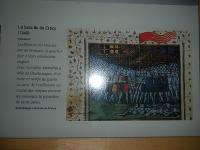
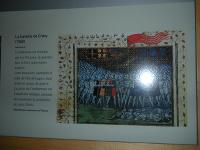
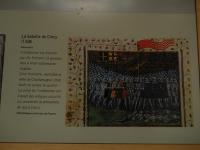
"La bataille de Crécy (1346).
L'oriflamme est brandie par les Français (à gauche) face à leurs adversaires anglais.
Cette banière, identifiée à celle de Charlemagne, était levée en temps de guerre.
La prise de l'oriflamme sur l'autel des reliques assurait au souverain la protection de saint Denis"
("The Battle of Crecy (1346)
The oriflamme was brandished by the French (on the left) facing their English adversaries.
The banner, identified with that of Charlemagne, was lifted up in times of war.
Taking the oriflamme over the altar of the relics assured the sovereign of the protection of Saint-Denis")
Some help it was at the battle of Crécy (it was one of the 2 major French routs during the Hundred Years War)! From this you'd think the French had won (notice the heap of bodies on the English side)... Then again Philip VI didn't die at Crécy, so.
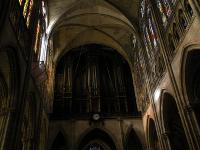
Organ above door
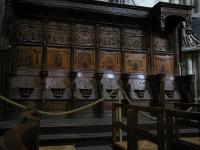
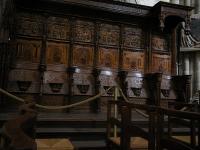
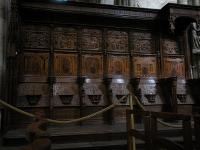
Choir stalls
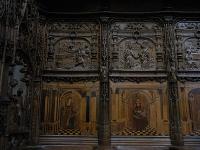
Choir stall detail
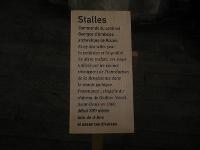
Choir stall plaque
"Exceptionnelles pour la profusion et la qualité du décor sculpté, ces sièges utilisés par les moines témoignent de l'introduction de la Renaissance dans le monde gothique... début XVIe siècle. bois de chêne et essences diverses"
("Exceptional for the profusion and qualify of the sculpted decoration, these seats used by the monks bear witness to the introduction of the Renaissance into the Gothic World... Start of 16th Century. Oak and various species")
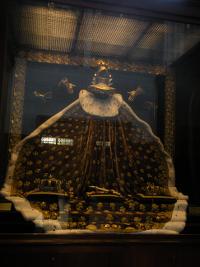
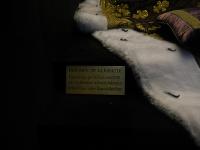
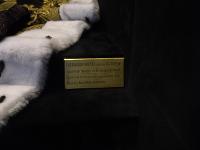
"Insignes de la Royauté
Commandés par le Roi Louis XVIII pour les Obséques et Services Solennels célèbres dans l'église Royale de Saint-Denis"
("Insignias of Royalty
Ordered by King Louis XVIII for funerals and solemn services celebrated in the Royal Church of Saint-Denis")
There was also the Queen's Crown for the anniversary services for the death of Queen Marie "Let them Eat Cake" Antoinette
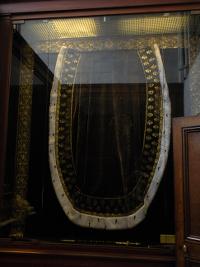
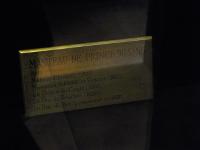
"Manteau de Prince du Sang
ayant servi pour les pompes funèbres de [xxx]"
("Mantle of Price of the Blood [a descendent of the male line]
used at the funerals of [xxx]")
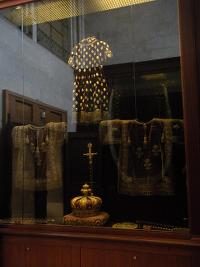
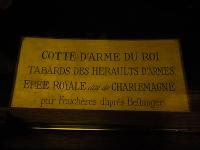
Coat of Arms of the King, Tabards of the Heralds of Arms and Royal Sword called Charlemagne
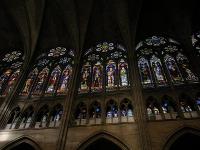
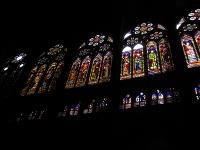
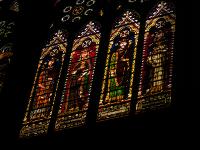
Stained glass and detail. I'm guessing this is 18th or early 19th century work. Most of the stained glass I noticed looked like it dated from this period - at least it wasn't disgusting like 20th century stained glass.
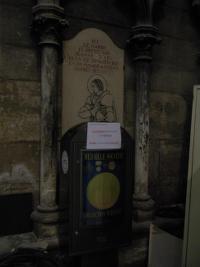
A more precise commemoration of Joan of Arc
Documentary on archaeological work at Saint-Denis, with the most vigorous sign language I've seen
Next was all the tombs (sadly empty due to the French Revolution - though some 12th century stained glass survives). First was the crypt.
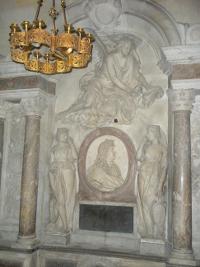
The signage was not clear as to who this was (possibly Louis XIV). The tomb was also 7m behind a rope, which didn't help.
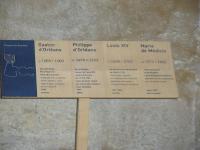
Plaque

Henri IV
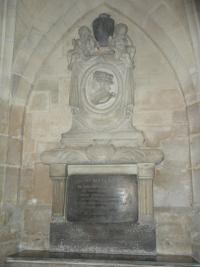
"Maria Theresa of Austria". No, not that one - this one was the wife of Louis XIV. This case is quite cofusing, because she's Maria Theresa of Spain in English, but Marie-Thérèse d'Autriche in French. Go figure (you can blame dynastic titles for part of it).
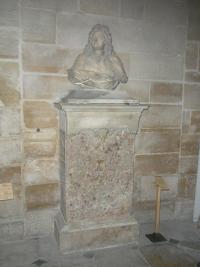
Louis XVIII
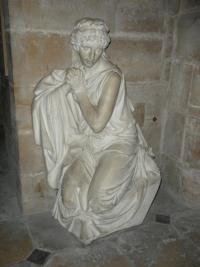
Louis XV. Dedicated to him and not him, at any rate. The sculpture is called "Pleureuse" ("Mourner")
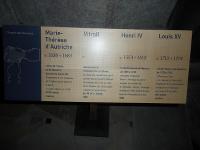
Another plaque
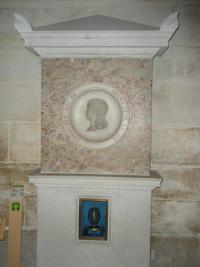
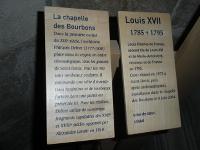
Louis XVII and his heart
There was also an exhibition: "Henri IV à Saint-Denis" ("Henry IV at Saint-Denis"). He converted to Catholicism to placate France.
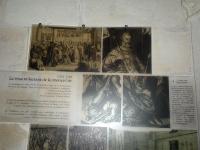
"La conversion de Henri IV fut la première étape de la réconciliation du roi et du royaume. Trois actes apparaissent solidaires et enchaînés :
l'abjuration (à Saint-Denis)
le sacre religieux (à Chartres)
le sacre populaire (l'entrée à Paris)"
("The conversion of Henri IV was the first step in the reconciliation of the King and the Kingdom. 3 linked acts:
The abjuration [of Protestantism] (at Saint-Denis)
The religious coronation (at Chartres)
The people's coronation (the entrance into Paris)"
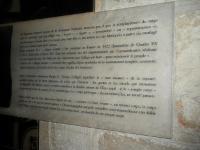
This talks about funerary effigies as second bodies, and their other significances
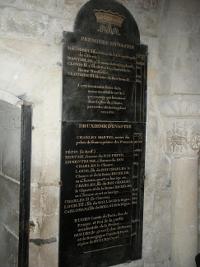
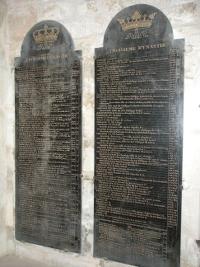
List of Kings of France
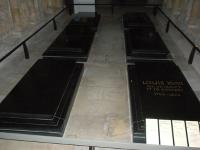
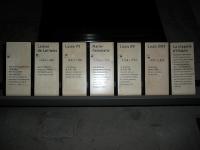
Assorted plain tombs
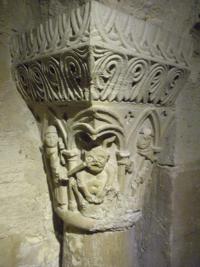
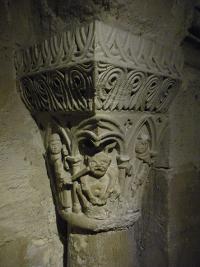
Gargoyle Capital
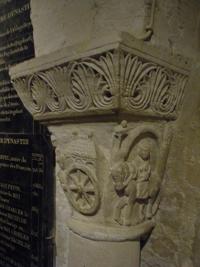
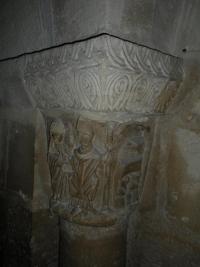
Other capitals
I then emerged from the crypt to look at the funerary monuments.
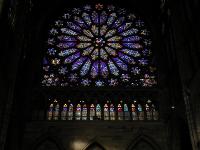
Rose Window
Unlike the ones in the crypt, the tombs above ground were original as they had been claimed by Lenoir for his Museum of French Monuments (and thus saved during the Revolution).
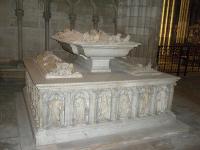
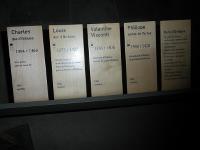
Dukes of Orleans
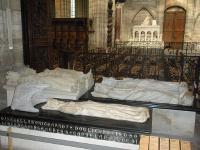

Charles Martel and Clovis II would be sad to know how small their effigies were
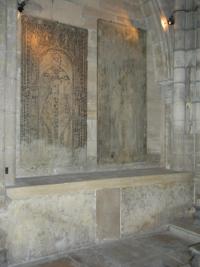
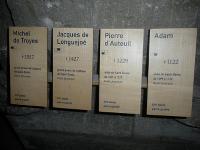
Abbots and Priors
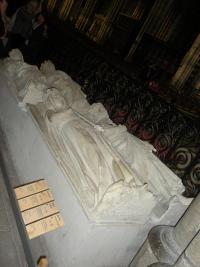
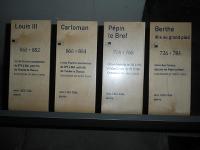
Pepin the Short and other short people
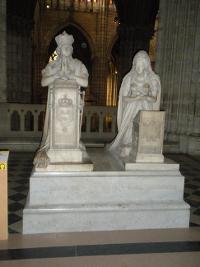
IIRC this is what Rough Guide called Louis XVI and a busty Marie Antoinette
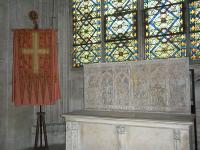
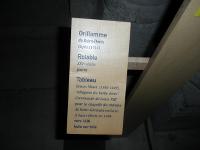
Oriflamme of Saint-Denis (1914 copy), altarpiece, table
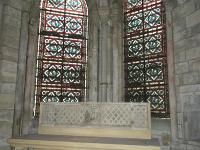
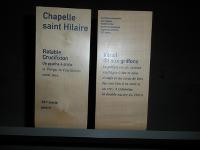
Saint Hilaire chapel
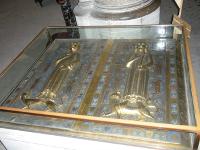
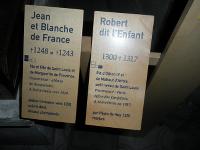
Jean and Blanche of France
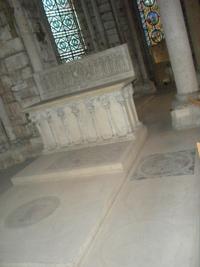
Saint Firmin Chapel
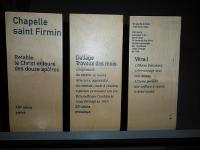
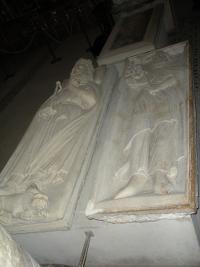
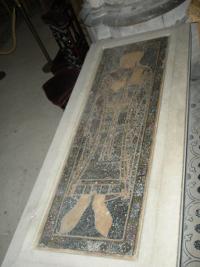
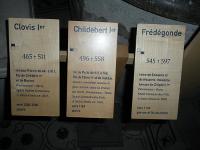
Clovis I and other Franks
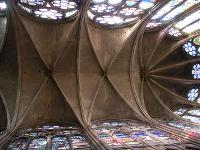
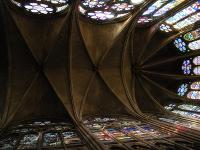
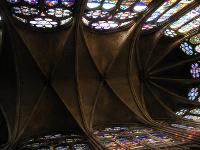
Basilica roof
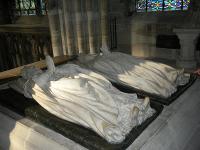
The labelling wasn't very good so I can't pinpoint who these people were
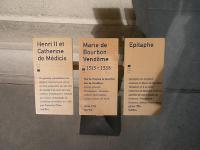
Semi-orphaned plaque

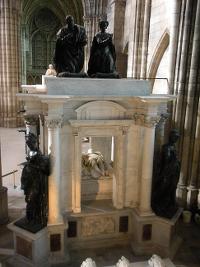
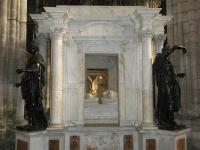
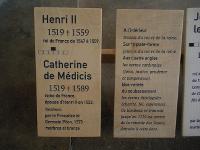
Grand tomb of Henri II and Cathedrine de Medici. The positioning on the plaque is a bit confusing
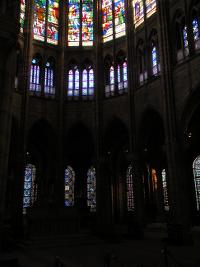
Altar
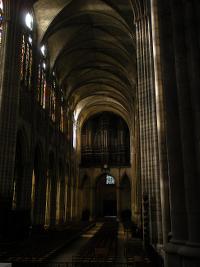
Looking back down the nave
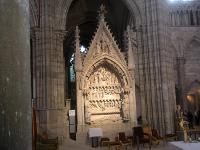
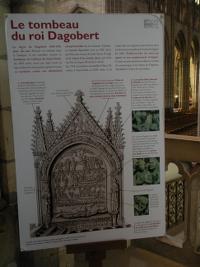
"The tomb of Dagobert" (the first King to be entombed here)
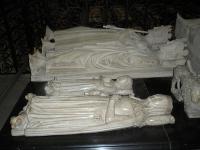
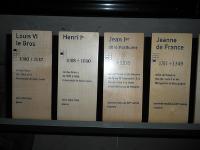
Louis VI n'est pas gros

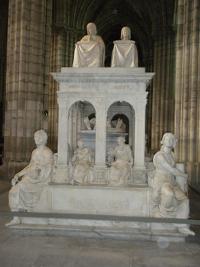

Louis XII and Anne of Britanny - the last ruler of a free Britanny
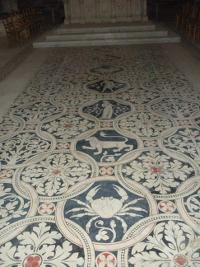
Floor with Zodiac signs
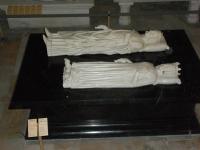
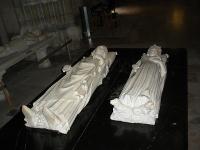
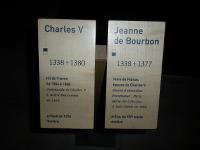
Charles V, Jeanne of Bourbon and her intestines. I didn't know why she was clutching a sack with them to her chest as The Rough Guide didn't say, but further research reveals:
"A côté, le détail à taille réelle du gisant d’entrailles de la reine Jeanne de Bourbon, épouse de Charles V, montre sa main qui tient son sac d’entrailles." (Classeur d'accompagnement: Basilique sensorielle)
"Les tombes d’entrailles figurent aussi un gisant maintenant sur sa poitrine un sac semblable à celui où l’on enfermait les viscères. Le tombeau de la reine Jeanne de Bourbon, épouse de Charles V, dont les entrailles furent inhumées en 1378 aux Célestins de Paris (aujourd’hui exposé dans la basilique de Saint-Denis) présente un gisant dont la main gauche serre contre sa poitrine un paquet d’étoffes" (D'or et de cendres: la mort et les funérailles des princes dans le royaume de France au bas Moyen Âge)
"The gisant for Jeanne de Bourbon's entrail tomb, now in Saint-Denis, is all that remains of the elaborate structure formerly set in front of the main altar in the church of the Célestins" (The Portraits of Charles V of France (1338-1380))
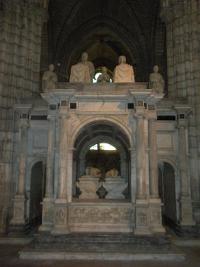
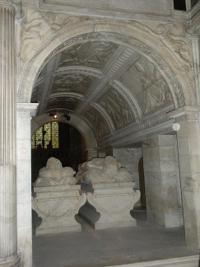
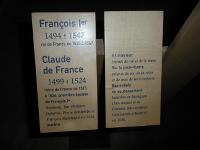
Francis I and Claude of France
From the 2 huge funerary ensembles I could see (i.e. not that of Francis I), the principle was that if you had a big tomb with effigies both inside and on top, the faces of the effigies inside would look miserable (with looks of suffering) - so you needed the ones on top to look better.
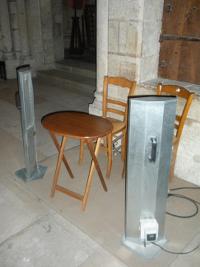
The attendant said the place was as cold as an icicle in the winter - ergp the *two* heaters (the other attendant got up before I snapped this)